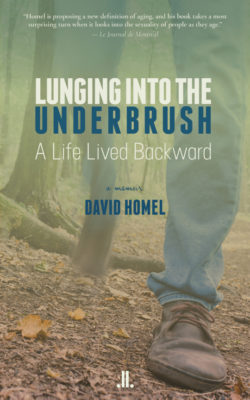George Burns, who died at the respectable age of 100, famously said, “You can’t help getting older, but you don’t have to get old.” Since Burns revived his career at age 79, a career that began in vaudeville, he knew whereof he spoke.
In his admirable memoir Lunging into the Underbrush: A Life Lived Backward, David Homel clearly agrees with Burns when he declares that aging begins when you become aware of your limits. The irony is that we only recognize those limits as we grow older. However, for Homel, that awareness came very early, literally by accident. From the fateful moment he inadvertently steps off a cliff, to discovering what he truly wants from life, Homel’s absorbing story charts the map of his life’s journey, and ends with a meditation on the fruitless effort to stave off aging.
In 1970, at 18, Chicago-born Homel leaves America to study in Paris, an adroit move to avoid being drafted into the army. Paris is inhospitable for a penniless student, but at least he’s not in Vietnam. On a hiking trip in southern Spain with friends, in search of shelter one dark and stormy night, Homel falls off a cliff, described by his friend in a letter home as “lunging into the underbrush.”

Lunging Into The Underbrush
A Life Lived Backward
David Homel
Linda Leith Publishing
$21.95
paper
247pp
9781773900797
Returning to Chicago in 1972, Homel takes a physically challenging job in a meat-packing plant and continues to take risks with his health, that he later chalks up to survivor’s guilt because: “Others went to Vietnam in my place […] and did not come back.” In 1975, Homel moves into a direction better suited to his talents and physical stamina: he begins literary studies on a scholarship at the University of Toronto. Once again acknowledging one of those ironies about the futility of making life plans, he writes, “All that trouble to resist the draft and beat the system […] and not slip away to Canada” ends with him making Canada home.
“I came to see the US as a patient who does not know how to get better,” he writes. Eventually, he considers whether that is a truth he can apply to himself as well.
Toronto is as inhospitable as Paris. In 1980, once again lunging into the underbrush, in what may have seemed the most uninviting time for an American in Quebec, David Homel moves to Montreal. Here he has carved out a career as the author of eight novels, plus five others for young readers with co-author Marie-Louise Gay; and as a successful literary translator, journalist, documentary film director, and creative writing teacher.
About halfway through Lunging into the Underbrush, Homel segues with skill and a finely honed insight on the many issues he has faced to become “a physician of my soul and heal myself.” He ruminates about our obsession with body image (from the perspective of both men and women), the aging process, performance anxiety (for men but not so much for women), and the choices that life offers us, if we’re paying attention. Clearly, Homel has been doing just that.
As the author points out, you don’t have to fall off a cliff to be struggling with anxiety over your body image, what Homel calls “a shifting canvas, a funhouse mirror.” His solution to taking back control is to join the Park Ave. YMCA, where being a member is what Homel has called “a form of pragmatic religion.” There he begins his true rehabilitation: the reconstruction of his body that has become his life’s work. He is not interested in body-building but in making the most of the body he has. And he revels in his success, sharing his thoughts about the importance of acceptance and self-knowledge, the lessons he learned in the first half of the book.
What is most refreshing for this reviewer is Homel’s innate understanding of how women experience aging, image, and how affection trumps sexual prowess. For men worried about performance, about aging, Homel’s understanding is a must-read.
Finally, he also speaks to the importance of how we must be “generous to the selves we have become,” which he summarizes by writing: “It might sound unlikely, but this whole chronicle is a record of unlikely events reaching an unexpected conclusion.”
I would add that although this is not a self-help book, it is a guide for those of us who try to draw on lessons from our lives to emerge stronger and happier at any age.mRb






0 Comments